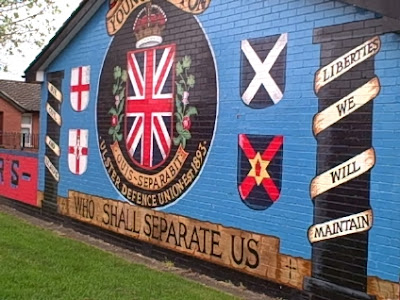Northern Ireland: A Year of Change
Great changes seem to be occurring all over the world now – economic, political, spiritual and environmental – and Northern Ireland has not been left out of the season of renewal.
Many there are unified now in their insistence that peace and justice be established as a way of life for the North.
In April, the murder by dissident republicans of young Catholic police officer Ronan Kerr, because he was both Catholic and a police officer, was met with unified disgust by the Northern people.
When hundreds of many different beliefs stood in front of Belfast City Hall, each holding a front page photo of Officer Kerr in front of them, the message was clear: We will not be intimidated by senseless violence.
The same response occurred after republican dissidents set off a bomb on October 12 in Derry‘s City of Culture office, the second this year. Derry is to be the EuropeanCity of Culture 2013 -- the first city in the UK to carry that honor. More than 250 artists, politicians, community workers and townspeople gathered the day after in Derry’s city centre to demand that the violence end.



The family of Catholic solicitor Pat Finucane, murdered by loyalist paramilitaries in 1989, have campaigned for more than 20 years for an independent public inquiry to prove collusion on the part of British security forces in the killing. The Finucanes met with British Prime Minister David Cameron on October 11 to hear whether it would be granted.
Cameron told the family in a meeting at Downing Street that a queen’s counsel would review the case and interpret it on his or her own, but that there would be no public inquiry. Finucane’s widow Geraldine told reporters she was so angry she could barely speak. The Finucane family are continuing their campaign, with the support of members of the Republic of Ireland government.
In the part of east Belfast where I spent the past year, the Ulster Volunteer Force (UVF) announced in the local papers that they strongly disapproved of the increasing number of cross-community projects in the area that were bringing Protestants and Catholics together to work on art projects, community projects, and to foster new friendships. Sensing their decades-long hold on the area slipping, they wanted to reinforce the fear that once kept them in charge.


This announcement was concurrent with two nights of the worst rioting east Belfast had seen in 10 years. The series of retaliations and counter-retaliations occurred after 80 UVF men invaded the nearby Catholic Short Strand area in balaclavas and attacked homes there the night before.
Local people were frightened by the attacks, the riots, the gunfire. They feared retribution if they carried on meeting with friends who lived on the other side of the peace line. Most east Belfast cross-community groups stopped meeting for a month or two.

But by September the groups began meeting again, with a renewed sense of purpose. This was another, quieter form of demonstration. But the waves of change resounded as clearly as they would have had there been crowds of people taking to the streets. These are "the 99%" who want peace, fairness, equality and justice. And they are claiming it for themselves now.
Caroline Oceana Ryan is the Northern Ireland Editor for Wandering Educators, and Author, An Old Castle Standing on a Ford: One Yank's Life in an Almost Peaceful Belfast (Eloquent Books, 2010)
http://www.anoldcastle.com
All photos © Caroline Oceana Ryan





















